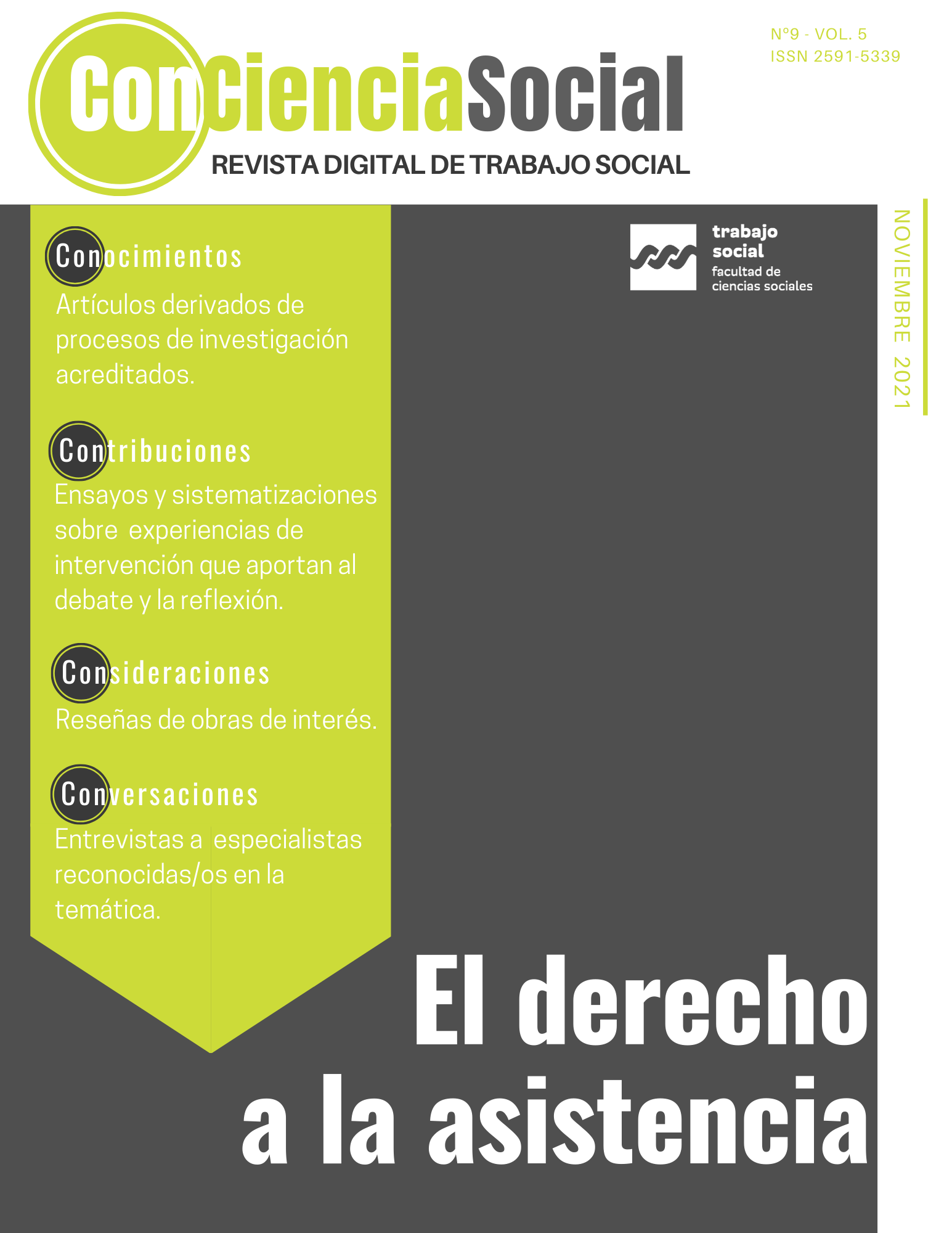Editorial
The right to assistance
Keywords:
editorial, derecho a la asistencia, conciencia social 9Abstract
Assistance, both in its conceptual and practical dimensions, has been going through different vicissitudes not only in the field of social work but also in the social sciences in general.
Analyzed, valued and also attacked from different angles, the validity of the discussion on assistance remains intact, although the arguments vary. There are divergences in terms of conceptions, contents, status, meanings, genealogy, and its relationship with the public-private tension. We find ourselves, therefore, before a problematic category that is the object of different theoretical meanings and divergent and even antagonistic political assessments. At the political level, assistance has been criticized from both the right and the left. And these differences are reflected not only in the diachronic order, but also in the synchronic order.
Thus, those who belong to what we could call the new right, which also includes neoliberalism, attack assistance, and social rights in general, as incompatible with the claims of merit-based justice. And by ignoring inequalities, they claim that assistance - all state intervention, except when it protects private property interests - undermines merit-based justice, promotes passivity and clientelism, generating clients protected by the bureaucracy, which leads to servitude. They understand that the responsibility of earning a living is inalienable, so that whenever this position reaches places of state power, one of its priorities lies precisely in the maximum possible reduction of any social safety net. In short, there is an underlying Malthusonian inspiration here - we have heard it in these times of pandemics with the preaching "let those who have to die die" - which also leads them to point out that the "wealth" of poor people weakens their predisposition to work.
But we also find criticisms on the opposite side, from the so-called left, which in a very general way can be summarized in that the institutions of the welfare state promote the clientelization, passivity and dependence of the citizenry - coinciding with the positions of the right - but also disorient workers by co-opting them and distancing them from their supposed historical mission, which is the construction of socialism.
In the field of social work, the divergence of positions is reiterated, at the same time that the idea of merit has been naturalized in daily practice, which is at the basis of the scrutiny function required of the profession, a function aimed at verifying that those who demand assistance have the necessary conditions to do so and that they are not trying to "misappropriate the available resources" -poor sectors have historically been subject to this suspicion-; Perhaps this naturalization has not been confronted with sufficient theoretical and political force by those of us who recognize assistance as a right and not as a waste.
On the other hand, the neoliberal narrative has managed to install as the axis of common sense the separation between individual living conditions and the project of the nation. Thus, the predominant idea in the social imaginary is that which maintains that personal achievements are completely independent of State policies and that they are the simple and direct result of individual effort. This content results in a direct path towards the rejection of assistance as a fundamental aspect of social protection and crystallizes in the vague and confused notion that "the government takes from me to give to the lazy". This position, typical of the middle classes, articulates two prejudices: on the one hand, that what each person achieves is the exclusive product of his or her personal effort, and on the other, that if they have not achieved their objectives it is because "the government feeds lazy people".
Thus, at the societal level, the neoliberal conception of assistance has hegemonized common sense, specifically when it comes to the judgment about the protection of the population in need. The cultural work of decolonization - if we would like to undertake it - lies precisely in dismantling this plot to clear the way towards the consent to the right to assistance, no longer as welfare but as a reparatory policy of the effects that the various axes that determine inequalities generate in the subaltern population.
We say this thinking of assistance that effectively repairs the consequences of inequalities, but also develops capacities; that as the exercise of a right enables the demand for new rights, thus generating subjects capable of thinking about their situation and disputing their living conditions in the socio-political arena. Thus, assistance as a right requires the explanation of one more attribute: that of conflictivity. The form, scope and content of assistance in different moments and spaces are the expression and result of a particular state of the relationship of forces, of the processes of struggle for needs that develops within the field of social intervention. In other words, political reality in general and social policy in particular, express occasional results of a struggle to impose certain meanings and practices. Hence, the meaning and directionality of assistance also express the struggles established between subordinate groups and the State, in a given correlation of forces.
Now then: we say right to assistance. Why do rights exist? A right implies the recognition of a debt that derives from the asymmetry in the possibilities of being, an asymmetry that is the structuring axis of capitalism. The expression "I have the right to" expresses the recognition of a debt that becomes concrete as a demand. And such recognition is only possible as long as society has consented that the debt exists. Therefore, working on assistance from a rights perspective is not a declamation, but an invitation to work on the conflictive processes of reconstruction of the debt-struggle-rights relationship, so that in addition to the ownership, each recognized right has the necessary elements for its provision.
Finally, we are aware of the importance of the right to assistance in order to improve the living conditions of the most disadvantaged sectors. Therein lies the restorative sense of assistance to the dispossessed. But we also know that, if we are to confront the structuring asymmetry of capitalism, it will no longer be enough to deal only with poverty, but it will also be necessary to address wealth. This means not only "counting the poor" and asking "how poor they are", but also "counting the rich" and asking "how and why they are so rich". This is no longer a matter of social policies, but of politics, pure and simple. Of a politics capable of problematizing in depth, of producing and activating some richer, deeper and more complex ways of radicalization. But its radicalization requires subjects that embody such utopia. It concerns us, therefore, to discuss the real possibilities and limits of critical and emancipatory professional intervention, in order to contribute to the construction of such subjects.
References
-
Downloads
Published
Issue
Section
License
Copyright (c) 2021 Nora Aquín

This work is licensed under a Creative Commons Attribution-ShareAlike 4.0 International License.
Aquellos autores/as que tengan publicaciones con esta revista, aceptan los términos siguientes:Los autores/as conservarán sus derechos de autor y garantizarán a la revista el derecho de primera publicación de su obra, el cuál estará simultáneamente sujeto a la Licencia de reconocimiento de Creative Commons que permite a terceros:
Compartir — copiar y redistribuir el material en cualquier medio o formato
Adaptar — remezclar, transformar y construir a partir del material para cualquier propósito, incluso comercialmente.
La licenciante no puede revocar estas libertades en tanto usted siga los términos de la licencia.Los autores/as podrán adoptar otros acuerdos de licencia no exclusiva de distribución de la versión de la obra publicada (p. ej.: depositarla en un archivo telemático institucional o publicarla en un volumen monográfico) siempre que se indique la publicación inicial en esta revista.
- Se permite y recomienda a los autores/as difundir su obra a través de Internet (p. ej.: en archivos telemáticos institucionales o en su página web) después del proceso de publicación, lo cual puede producir intercambios interesantes y aumentar las citas de la obra publicada. (Véase El efecto del acceso abierto).
Los derechos de explotación comercial (Copyrigth) quedan reservados para los autores.













